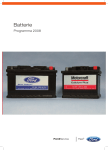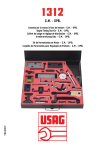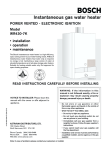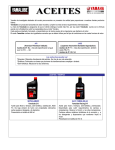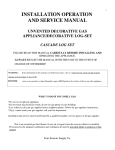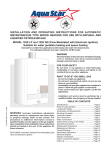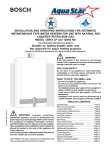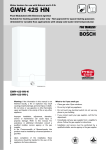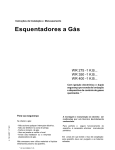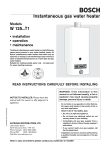Download Bosch WR 400-7.K Series Operating instructions
Transcript
Instantaneous gas water heater ELECTRONIC IGNITION Model WR 400-7.K.. • installation • operation • maintenance The Bosch instantaneous water heater is a high efficiency, space saving answer to your water heating needs. All Bosch instantaneous water heaters heat water only as required; no energy is lost maintaining a large volume of water at elevated temperatures as in tank-type storage water heaters. Suitable for heating potable water only – not approved for space heating purposes. READ INSTRUCTIONS CAREFULLY BEFORE INSTALLING 6 720 606 560 CA (05.05) AL NOTICE TO INSTALLER: Please leave this manual with the owner or affix adjacent to appliance. ASTRAVAN DISTRIBUTORS, LTD. 123 Charles Street North Vancouver, B.C. V7H 1S1 Phone Canada: (604) 929-5488 Phone USA: (206) 860-8448 Web Site: www.astravan.com WARNING: If the information in this manual is not followed exactly, a fire or explosion may result causing property damage, personal injury or death. - Do not store or use gasoline or other flammable vapors and liquids in the vicinity of this or any other applicance. - WHAT TO DO IF YOU SMELL GAS • Do not try to light any appliance. • Do not touch any electrical switch; do not use any phone in your building. • Immediately call your gas supplier from a neighbor’s phone. Follow the gas supplier’s instructions. • If you cannot reach your gas supplier, call the fire department. - Installation and service must be performed by a qualified installer, service agency or the gas supplier. Note: In case of problems please contact your salesman or installer DIMENSIONS Figure 1 Maximum hydrostatic water pressure - 1.03 MPa (150 p.s.i.) Maximum recommended working pressure - 0.69 MPa (100 p.s.i.) Minimum working pressure - 0.0138 MPa (2 p.s.i.) at 2 Litres/min. (0.5 U.S. gals./min.). Model WR 400-7.K.. Type of Gas Altitude Input Main Burner Orifices Size, mm Qt. natural standart 34.28 kW 1.20 diam. 18 propane/LP (0-2,000 ft.) (117,000 Btu/hr) 0.79 diam. 18 natural high * 30.85 kW 1.20 diam. 18 propane/LP (2,000-4,500 ft.) (105,000 Btu/hr) 0.79 diam. 18 * The high altitude ratings listed are Canadian Gas Association high altitude ratings and are valid only in Canada. In the U.S., the National Fuel Gas Code, ANSI Z223.1-1988, recommends for high altitude installations above 2,000 feet, that the input rate be reduced 4% for each 1,000 feet above sea level. - See page 8. 2 6 720 606 560 FORWARD The design of the WR400-7.K.. complies with CAN 1-4.3 and ANSI Z21.10 (latest edition) as an instantaneous gas water heater. In addition, the WR400-7.K.. also complies with CAN 1-2.17 for use at high altitudes, 2.000 – 4.500 ft. above sea level. Installation, operation and maintenance information are provided in this manual. Installation and operation instructions should be thoroughly reviewed before proceeding with installation of the BOSCH instantaneous gas water heater. The BOSCH instantaneous gas water heater is designed to operate on natural or propane gas; however, make sure that gas on which heater is to operate is the same as specified on the heater’s model/rating plate. In addition to these instrutions,the water heater shall be installed in accordance with CAN/CGA-B149 Installation Code (in Canada) or Z223-1- latest edition, National Fuel Gas Code (in U.S.A.) and/or local installation Code. These shall be carefully followed in all cases. INSTALLATION INSTRUCTIONS Note: Proper plumbing, venting, gas connections and an adequate supply of combustion air are required for safe and reliable operation. Ability equivalent to that of a licensed tradesman in the field involved is required for installation and/or servicing of these water heaters. AIR REQUIREMENTS LOCATION In order to prevent corrosion, make sure that the combustion air is kept free of aggressive substances. Substances that specially contribute to corrosion are halogenated hydrocarbons (e.g. chlorine and fluorine), which are contained in solvents, paint, adhesives, propellant gases, various household cleaners, etc. Take precautionary measures as necessary. Before installing the BOSCH instantaneous gas water heater consideration must be given to proper location. The location should be as close to a chimney or gas vent as practicable, in an area with an adequate air supply and as centralized with the piping system as possible. The heater should not be located in an area where it will be subject to freezing. The heater should be located in an area where leakage of the heater or its connections will not result in damage to the area adjacent to the heater or to lower floors of the structure. Note: When such locations cannot be avoided, it is recommended that a suitable drain pan, adequately drained, be installed under the water heater. The pan must not restrict combustion air flow. For safe operation, sufficient air for combustion, ventilation and dilution of flue gases must be available. An insufficient supply of air will result in a yellow luminous burner flame, causing carboning or sooting of the heat exchanger. In unconfined spaces, in buildings of normal construction, infiltration normally is adequate to provide air for combustion, ventilation and dilution of flue gases. However, a confined space must be provided with two permanent openings to provide combustion and ventilation air to the appliance. Each opening shall have a free area of one square inch per 1000 BTU/Hr* of total input rating of all appliances in the enclosure. One opening shall be within 12 inches of the top and one within 12 inches of the bottom of the enclosure. * SPECIAL NOTE When the WR400-7.K.. is installed in a confined space of minimum size the openings described above must be increased to a size of 1½ square inches per 1000 BTU/Hr. In other words, when installed in a minimum sized confined space the two openings that are to be made in the enclosure within 12 inches of the top and 12 inches of the bottom must each have a minimum free area of, (1½”) x (117)= 175.5 square inches. 6 720 606 560 3 For either a confined or unconfined space in a building of tight construction with inadequate infiltration, air must be drawn from the outdoors or from spaces that freely communicate with the outdoors. Two permanent openings located as indicated are to be provided as follows: 1. 2. When communicating with outdoor directly, or by means of vertical ducts, each opening shall have a free area of not less than one square inch per 4000 BTU/Hr of total input of all appliances in the space. When communicating with outdoor by means of horizontal ducts, each opening shall have a free area of not less than one square inch per 2000 BTU/Hr of total input of all appliances in the space. MOUNTING The WR400-7.K.. is designed certified for mounting to a wall. The heater must not be installed on a carpeted wall. The heater must be mounted to the wall using appropriate anchoring materials. Note: If wall is a stud wall sheathed with plasterboard it is recommended that support board(s), either 1x4’s or ½‘’ (minimum) plywood first be attached across a pair of studs and then the heaters should be attached to the support boards. See Figure2. For detailed requirements see: in Canada, CAN 1-B 149 Installation Codes in U.S.A., ANSI Z223.1- latest edition, National Fuel Gas Code. WALL STUDS SUPPORT BOARD WARNING! 1. 2. Flammable materials, gasoline, pressurized containers, or any other items or articles that are potentially fire hazards must never be placed on or adjacent to the heater. The appliance area must be kept free of all combustible materials, gasoline and other flammable vapors and liquids. Do not obstruct the flow of combustion and ventilation air to the appliance. 1” X 4” SPACE BOARD Figure 2 CLEARANCE The WR400-7.K.. is designed certified for installation on a combustible wall and for installation in an alcove or closet with minimum clearances to combustible construction of 0 mm from back, 102 mm (4 inches) from sides, 305 mm (12 inches) from top an bottom, and 102 mm (4 inches) from front. A minimum of 305 mm (12 inches) shall be allowed for maintenance of serviceable parts. Clearance from vent is dependant upon the clearance rating of the venting material used; that is, type B-1 vent is approved for 1 inch clearance, B-2 vent for 2 inches, etc. Expansion and contraction of piping due to changing water temperature in the pipes imparts movement to the heater which, if mounted directly to a brittle, friable board, such as plasterboard, can cause failure of mounting. Warning! Check Flue Gas Safety Device good functioning, please proceed as explained in "Flue gas safety device" page 9. THIS APPLIANCE MUST BE INSTALLED IN ACCORDANCE WITH THE NATIONAL FUEL GAS CODE ANSI Z223.1- latest edition in U.S.A. or CAN/CGA- B149 INSTALLATION CODES IN CANADA, LOCAL CODES AND/OR THE REQUIREMENTS OF THE AUTHORITY HAVING JURISDICTION MUST BE FOLLOWED. 4 6 720 606 560 DRIP TRAY If the water heater is being mounted above a floor of combustible construction the drip tray (shipped loose in the carton with the water heater) must be attached to the bottom of the front cover of the water heater at the time of installation. The drip tray should be attached to the front cover, using screws provided, as shown in Figure 3. Failure to use drip tray when installing unit above a floor of combustible construction will cause an unsafe condition and possible fire and will be in violation of A.G.A and C.G.A. certification of the unit. For high altitude use the adapter must be installed as shown in Figure 4, without alteration, before connecting the six inch flue to the unit. The adapter must be secured to the draft diverter outlet with a minimum of two screws. Also, in Canada, the gas pressure regulator supplied with the water heater is factory preset to deliver gas to the water heater at the proper pressure setting for high altitude operation, see PRESSURE REGULATION section of this manual, table 1 on page 8. WARNING! Failure to increase vent size on WR400-7.K.. to six inches and/or to assure that manifold is set to proper value listed on rating plate for applications at altitudes in range 2.000 to 4.500 ft. above sea level will cause unsafe venting, asphyxiation, and voids C.G.A. certification. WATER CONNECTIONS SCREWS INCANDESCENT PARTICLE TRAY The BOSCH instantaneous water heaters are provided with two S-bend water connectors/adapters that must be connected to inlet and outlet connections on water valve assembly, see figure 5 below. Figure 3 VENTING The BOSCH instantaneous water heaters have built- in draft diverters and are designed for indoor installation only. The draft diverter outlet must be connected to a clear, unobstructed vent of the same size, or lager, refer to: - in Canada, CAN/CGA – B149 Installation Code for detailed requirements. In U.S.A., ANSI Z223.1- latest edition, National Fuel Gas Code for detailed requirements. The flue connection for the WR 400-7.K.. is 130mm (5 inches); however, in Canada for installation at high altitude (2.000-4.500 ft, above sea level) a six inch (6’’) flue is required, in Canada a 5’’x 6’’ adapter is required with the WR400-3.K.. high altitude installations. 5” X 6” ADAPTOR USED ON HIGH ALTITUDE Figure 5 The purpose of the S-bend water connectors/adapters is to provide threaded water connections that meet standards used in North America, ANSI Standard Taper Pipe Thread (1 ½“ NPT). The cold water should be connected to S-bend attached to inlet of water valve and hot water connection should be made to S-bend attached to outlet of water valve. If plastic piping is to be used, a 1.5 meter (approx. 5 feet) length of metal piping must first be attached to both the cold water inlet and hot water outlet of the water heater. Figure 4 6 720 606 560 Note: A shut-off valve should be placed in the cold water supply line to the heater to facilitate servicing the heater. 5 RELIEF VALVE The listed pressure relief valve supplied must be installed near the hot water outlet at time of installation of the heater. No valve is to be placed between the relief valve and the heater. A drain line must be connected to the relief valve to direct discharge to a safe location. Do not install reducing coupling or any other restriction in the discharge line. The discharge line must be installed so as to allow complete drainage of both the valve and the line. See figure 6. Check to make sure that the gas listed on the rating plate is same as gas listed on the pressure regulator. See PRESSURE REGULATION section of this manual for information regarding gas pressure settings. Note: Before attaching the gas supply line, be sure that all gas pipe is clean on the inside. To trap any dirt or foreign material in the gas supply line, a drip leg must be incorporated in the piping. The drip leg must be readily accessible and not subject to freezing conditions. Install in accordance with the recommendations of serving gas supplier. Joint compounds (pipe dope) shall be applied sparingly and only to the male threads of pipe joints. Do not apply compound to the first two threads. The joint compound must be resistant to the action of liquified petroleum gases. Before placing water heater in operation check for gas leakage. Soap and water solution, or other material acceptable for this purpose, shall be used in locating gas leaks. Matches, candles, lighters, or other ignition sources shall not be used for this purpose. Figure 6 WARNING GAS CONNECTION Before connecting the gas supply to the heater check heater’s model/rating plate to make sure that gas on which heater is to operate is the same as specified on the model/rating plate. The heater and its individual shutoff valve must be disconnected from the gas supply piping system during any pressure testing of the gas supply piping system at test pressures in excess of 3,45 KPa (½ psig). The WR400-7.K.. instantaneous gas water heaters are supplied with a gas pressure regulator that must be installed on the heater before attaching the gas supply line, see figure 7. Failure to install the gas pressure regulator as show in figure 7 will be a violation of A.G.A and C.G.A certification of the unit. The water heater must be isolated from the gas supply piping system by closing its individual manual shutoff valve during any pressure testing of the gas supply piping system at test pressures equal to or less than 3,45 KPa (½ psig). BOSCH water heaters are shipped from the factory with the gas pressure regulators preset for the gas shown on the rating plate to the correct pressure: in Canada, for high altitude operation; in U.S., for standard altitude operation unless specially marked as a high altitude unit. The water heater, including the pressure regulator provided with it, must not be operated at gas supply pressures in excess of 3,45 KPa (½ psig). If overpressure has occurred such as trough improper testing of the gas lines or emergency malfunction of the supply system, the gas valve and regulator must be checked for safe operation. Make sure that the outside vent valves are protected against blockage. These are part of the gas supply system, not the water heater. Vent blockage may occur during ice storms. GAS INLET PIPE PRESSURE TAP T Figure 7 GAS MANIFOLD PRESSURE TEST POINT T For measuring correct regulator operating pressure. 6 G662_042 PRESSURE REGULATOR Figure 7 a) Gas Burner test point D for measuring pressure at full flow and input 6 720 606 560 OPERATING INSTRUCTIONS WARNING! If the water heater has been damaged or exposed to fire or sooting, or if any part has been underwater, do not use. Immediately call a qualified service technician to inspect the appliance and to replace any part of the control system and any gas control which as been underwater and to clean the heater exchanger assembly and water valve. FILLING Before proceeding with operation of the water heater make sure that the system is filled with water: Make sure drain is closed. See figure 8, below. Open a nearby hot water faucet to permit the water to fill the heater and piping. - Close the hot water faucet after the water flows freely and all air has escaped from the system. The water heater is now ready to be lit. WATER VALVE TO HEAT EXCHANGER FROM HEAT EXCHANGER LIGHTING AND OPERATING INSTRUCTIONS 1. STOP! Read the safety information above on this label. 2. The gas valve must be shut off by putting the ON/OFF ”. Wait five (5) minutes to clear switch to position “ out any gas. If you smell gas, STOP! Follow “B” in the safety information above. If you do not smell gas, go to the next step. 3. This water heater is equipped with a safety pilot burner and an automatic ignition control system. 4. Set the ON/OFF switch to the “ ” position. In this position, the water heater is ready to use. (See Figure 9). 5. Turn the hot water faucet on the minimum flow rate required to activate the heater. The automatic ignition system first ignites the safety pilot burner which then ignites the main burner in about 4 seconds. Green LED indicator is on when main burner is on. 6. If the red LED indicator light is flashing, this is a warning that water pressure isn’t enough to ignite the main burner. 7. The pilot flame will extiguish 10-30 seconds after the burners come on. The burners will remain on until the hot water tap is turned off. NOTE: On a first time the initial installation, existence of air in the gas supply line and in the water line may cause some ignition delay. In that case, repeatedly open and close the hot water tap in order to restart the ignition process until all the air has been purged. TO TURN OFF GAS TO APPLIANCE DRAIN PLUG Turn off the manual lever on the gas supply line to the heater and set the ON/OFF switch to the OFF ( ) position. Figure 8 SERVICE HINT The screen (strainer) in the water valve, located in the inlet of the water valve, may require occasional cleaning due to foreign material in the water supply. This will restrict the flow of water and may affect heater operation and prolong filling time. To inspect the strainer, close the cold water supply valve ahead of the heater, disconnect the S-bend from the inlet of the water valve and remove strainer from inlet. Clean if required, replace strainer in inlet to the water valve, reconnected S- bend and turn on water supply. Light the water heater in accordance with the instructions on the Lighting and Operating Plate on the water heater. For your convenience, the instructions are repeated here: To start and to shut down the appliance press the button “ ”. The switch is located behind t he flip down cover plate on the front panel strip. - on - off Green light on = main burner on. Green light off = main burner off. If the red light is flashing, that means the water flow is not enough to ignite the burner. Figure 9 6 720 606 560 7 PRESSURE REGULATION The pressure regulator supplied with the water heater is adjusted to operate on the gas specified on the rating plate and: - in Canada, is factory preset to deliver gas at the high altitude setting listed on the rating plate and as shown below. - in the U.S.A., is factory preset to deliver gas at the standard altitude setting listed on the rating plate and as show below. The pressure setting of the gas pressure regulator should be checked at installation to assure that the setting is correct for the gas being used and the altitude at which the appliance is installed. See rating plate on the unit, Table 1, below, for proper setting. In Canada for a heater being installed at standard altitude (0- 2.000 ft. above sea level) the manifold pressure should be reset at installation to the value shown on the rating plate, or Table 1, below, for standard altitude. TEMPERATURE REGULATION The BOSCH WR400-7.K.. is equipped with a modulating gas valve which adjusts the flow of gas to the main burner in proportion to the water flow rate. Within its heating capacity the WR400-7.K.. attempts to maintain the set temperature rise across the heater. This temperature rise can be set in range of 25ºC-to-50ºC (45ºF-to-90ºF), by means of the water flow selector. See figure 11. When the water flow selector is turned to the right hand stop the water heater is set for 50ºC (90ºF) temperature rise; when the water flow selector is set to the left hand stop it is set for 25ºC (45ºF) temperature rise. Temperature Adjustment Knob Decrease temperature and increase flow Increases temperature and decreases flow T ADJUSTABLE PRESSURE REGULATOR G661_004 MANIFOLD TEST PRESSURE TAP Your appliance dealer and/or local gas supplier should be consulted in regard to any high altitude installation. If field adjustment is required it should be performed by a qualified serviceman experienced in such work. Figure 11 - Principles of Operation Figure 10 The gas pressures specified below refer to flow pressure taken at the pressure tap in the gas inlet pipe just above the pressure regulator, (see figure 10) while the heater is operating at full input. Gas pressures read at burner test point D (see fig.7 (a)) will usually read 1-1.5’’ W.C. less than below. Table 1 Appliance Regulator Pressure Setting Type of Gas natural propane natural propane Pressure tap kPa Inches, W.C. 1.41 5.7 2.61 10.5 1.14 4.6 2.09 8.4 Altitude standart (0.2,000 ft.) high* (2,000-4,500 ft.) * Note: The high altitude ratings listed are Canadian Gas Association high altitude ratings for the appliances and are only valid in Canada. In the U.S. the National Fuel Gas Code, ANSI 1-1988, recommends for high altitude installations, above 2000 feet that the input rate be reduced 4% for each 1.000 feet above sea level. 8 With the water flow selector turned to its right hand stop position (50ºC rise setting) and with an inlet water temperature of 10ºC (50ºF) the outlet water temperature will be maintained at approximately 60ºC (140ºF) in the water flow rate range of approximately 2 litres/min (0.5 U.S. gals./ min.) to 8 litres /min. (2.1 U.S. gals./min.). The minimum flow rate for operation, the “Threshold Flow Rate” referred to in the lighting instructions is 2 Litres/min (0.5 U.S. gals./min). If the water flow rate is below this level the main burner will not fire. If flow rate exceeds 8 litres/min (2.1 U.S. gals./min.) the temperature rise across the heater will decrease in proportion to the rate above this temperature. HIGH TEMPERATURE LIMIT SWITCH The BOSCH series instantaneous gas water heaters are equipped with a high temperature limit switch with a set point of approximately 90ºC (195ºF). If the water temperature at sensing points exceeds the set point the switch will open, interrupting the safety circuit and stopping gas flow to the pilot and main burner. Outage as the result of high limit operation indicates that the heater is not functioning properly. The heater should be checked by a qualified serviceman and the reason for the malfunction corrected. 6 720 606 560 MAINTENANCE AND SERVICE Approximately once a year, the Bosch should be checked, cleaned and serviced as necessary. To remove the front cover, first remove the incandescent particle tray, then pull off the temperature adjustment knob and unscrew and remove the plastic collar. THE FOLLOWING OPERATIONS SHOULD BE PERFORMED BY A QUALIFIED SERVICE PERSON: Do not use any wire or sharp object to clean orifices. Natural gas orifices are large enough that you can usually clean them by blowing through them. LP orifices, on the other hand, are too small to clean and should be replacement. To access the pilot orifice, remove 2 screws holding pilot assembly in place. Then loosen compression fittings to expose pilot orifice. Vent System: Should be checked annually. Clean and repair as needed. Water Valve (Part #24): The water valve on this heater should be serviced periodically. The frequency will depend on the mineral content of the water and conditions of use or whenever signs of corrosion appear at the gas and water valve joint. Check that the water inlet filter (# 27 on figure 16, page 14) is clean. Diaphragm should be replaced every 7-8 years in residential applications and 3-5 years for commercial applications. In acid water areas the venturi should also be replaced at the same time. Pilot Flame: The pilot flame should burn with a clean, sharp, blue flame and should resemble the diagram in Fig. 12. If the flame is soft and yellow the pilot screen may be dirty or the pilot burner orifice may need to be cleaned or replaced. The pilot flame should be approximately 2 inches long, extending past the flame sensor. If the flame is too small, it will not reach the flame sensor and the burners will note come on. 3mm Correct gap between pilot burner tip and electrode tip Sparking plug electrode PILOT ORIFICE Fig. 13 - Pilot burner with pilot orifice Main Burner Flames: The main burner flames should be blue, with a more intense blue cone in the center core. Yellow flames could be a sign of plugged or dirty burners, or a blockage on the heat exchangers fins. If some burners have yellow flames while others have good flames, it is likely that dust, lint or spider webs have partially clogged the burner venturis. To clean the burners, contact a gas service person. Mineral Scale Build-up: In hard water areas the Bosch, when operated at lower temperature settings, tend not to accumulate mineral buildup. If however, the heater is used at the higher temperature settings and the water has a high mineral content, periodic descaling may be necessary. The heating coils should be flushed with a descaling solution. Signs of scaling are rising outlet temperature and knocking noises when water is flowing. Pilot screen Flue gas safety device: The flue gas safety device must not under any circumstances be switched off, simulated or replaced by any other component. Flame sensor Sparking plug electrode Fig. 12 - Characteristic Pilot Flame To clean the pilot burner and/or the pilot orifice: Turn off the gas to the unit. Set the ON/OFF switch to OFF (position ). Remove the cover on the heater. To do so, pull of the temperature adjustment knob and unscrew and remove the plastic collar. Pull main cover out toward you and lift up and out. The pilot orifice should be cleaned or replaced. Do not enlarge orifice. 6 720 606 560 Operation and safety precautions The flue gas safety device checks the effectiveness of flue gas extraction by the flue. If it is inadequate, the appliance switches off automatically so that the combustion fumes do not escape into the room in which the appliance has been installed. The flue gas safety device resets after a coolingdown period. If the appliance shuts down while in operation, ventilate the room. Wait about 10 minutes then restart the appliance. If the problem recurs, call an engineer. The user must never make any modifications to the appliance. 9 Maintenance* If faults occur on the flue gas safety device, proceed as follows: Undo flue gas safety device fixing screw. Unplug igniter unit connector. Replace damaged component with new one and refit using the reverse of the procedure set out the table above. Function check* Flue gas safety device function check: Disconnect flue pipe Replace with pipe (about 50 cm long) with sealed end Fit pipe vertically Start up appliance at rated output and set temperature control to maximum temperature. Under those conditions, the appliance should shut down after two minutes. Remove temporary pipe and reconnect flue pipe. * This work may only be carried out by an approved engineer. TROUBLE SHOOTING Introduction The Bosch WR400-7.K.. burners are activated by a water flow valve. Numerous water related problems can cause this water valve to malfunction such as: Insufficient water flow volume or pressure to activate the burners at its minimum flow requirement; Dirt in the water flow valve causing it malfunction; Sediment built-up in faucet aerators, or shower heads; Uneven pressures between cold and hot, (with single lever faucets) Plumbing cross over. These water flow related problems can cause the heater to deliver less than its full output, or to fail to ignite or to shut down completely. Problems are stated in upper case, bold face. Most common causes for the problems follow in order of likelihood. The suggested solutions require that the cover be taken off. To do this, remove incandescent particle tray, pull off the temperature adjustment knob and unscrew and remove the plastic collar. Pull main cover out toward you and lift up and out. NO SPARK AT THE PILOT 1. ON/Off switch is not “On” (Position ). The On/Off switch is located behind the flipdown cover plate on the front panel strip. See fig. 9. 2. Water flow is not sufficient to activate heater. Water flow rate at faucet is below minimum flow needed to activate heater. When temperature adjustment knob is turned all the way clockwise, the Bosch WR400-7.K.. requires 1/2 gallon per minute flow to activate the heater. As a reference, this is a flow which would fill a quart jar in 30 seconds. If the temperature adjustment knob is turned fully counterclockwise, a flow rate of 1.1 gallons/minute is required to activate the heater. Red LED flashes when the water flow is not enough. 3. Water inlet filter is clogged Water flow is restricted, preventing needed flow to activate heater. Clean water inlet filter screen. 10 4. Cross over in water lines To confirm there is no cross-over in the plumbing, shut off the cold water supply to the Bosch water heater and open a hot water faucet. There should not be any water flowing at that faucet. Water running is a sign of a plumbing cross over. Consult your plumber. 5. Cold incoming water connection made to wrong side of heater Make sure cold water inlet connection is on the right side of heater when you are facing heater. 6. Water valve parts may be dirty or components damaged First check that venturi is free of dirt particles. Water valve and component parts must be totally free of dirt. In hard water areas, mineral deposits can eventually (3-5 years in hard water areas) corrode the water valve parts to a point where they may need replacing. Any sign of moisture at the top of the water valve is a sign that the water valve needs to be serviced immediately. 7. Loose connection at the ECO or the flue gas safety device Ignition sparker will not operate if the electrical circuit is interrupted. Check that the connections to the ECO are secure and tighten if necessary. SPARKS APPEAR AT PILOT WHEN HOT WATER TAP TURNED ON, BUT PILOT AND BURNERS WILL NOT IGNITE 1. Air in the Gas Line Normally this is a problem at time of initial installation, after the pipes have been worked on, or after a gas supply line has been allowed to empty. Bleed the air trapped in the gas line by turning the hot water faucet on and off until the air has been cleared from the line. 2. No gas to the Bosch A. Gas cock on gas line may not be open B. Gas regulator may be shut or damaged. Replace or unjam the regulator. Note: The regulator furnished with the heater is exclusively designed for low gas pressure. Excessive pressure will lock it up. Jamming usually happens when using propane gas if the gas pressure between the gas tank and the water heater’s gas regulator has not been reduced. See Page 8 for recommended correct gas pressure. To unjam a regulator, call your gas supplier. 3. Pilot orifice or gas valve is dirty Clogging of the pilot burner can be caused by dust in the air or dirt in the gas. The pilot orifice or gas filter may need to be cleaned or replaced. 5. Pilot electrovalve switch may need to be replaced (See Fig 16). Call your service person or call: Canada 1-800-663-8405, U.S.A. 1.800-824-7337. 6. Electronic Control Box may need to be replaced, (See Fig 16). Call your service person or call: Canada 1-800-663-8405, U.S.A. 1.800-824-7337. 6 720 606 560 PILOT LIGHTS BUT BURNERS WILL NOT COME ON 1. Confirm water valve assembly is working properly. 2. Confirm the flame sensor is in its proper position. 3. Confirm the burner electrovalve switch is functioning properly. Contact your service person or call: Canada 1-800-663-8405, U.S.A. 1.800-824-7337. 4. The electrical Control Box (Fig. 16) may need to be replaced. Contact your service person or call: Canada 1-800-663-8405, U.S.A. 1.800-824-7337. 5. Minimum inlet pressure on well is inadequate Check the inlet water pressure. On a private well, raise the minimum pressure setting to 40 psi for best performance. Confirm that the pressure tank is not water logged. WATER IS TOO HOT 1. Check for lime build-up. (See mineral scale p. 9) 2. Temperature Selection too high Turn the temperature adjustment knob counter-clockwise (to the left) to lower the maximum water temperature. Note: This will increase the activation flow rate. 3. Inlet water temperature is too hot (as with preheated water.) Decrease gas pressure. If this is not practical install tempering valve at inlet and mix with cold water. WATER IS NOT HOT ENOUGH 1. Temperature selection too low. Change the setting. Turn the temperature adjustment knob clockwise (to the right). Note: This will decrease the activation flow rate. 2. Water flow through the heater is higher than the capacity of the Bosch to heat it. This can be due to too high water inlet pressure (60 psi max. for best results) or due to acid water erosion of venturi. Check venturi (Part #30, Fig. 16). Fig. 14 - Electrical wiring diagram 1 2 3 4 5 6 7 burner electrovalve gas control valve pilot electrovalve flame sensor pilot electrode overheat sensor temperature limiter 8 9 10 11 12 13 electronic control box Led failure indicator Led indicator main burner condition on/off switch power generator flue gas safety device MAIN BURNERS GO OUT DURING HOT WATER USE 1. Flow rate diminished below activation rate 2. Unbalanced pressure in the water lines The added restriction caused by the Bosch in the hot water system can result in uneven pressures between the cold and the hot. In such cases when mixing cold water at the tap, the lower hot water pressure may be overpowered by a much higher cold water pressure, which may cause the Bosch burners to shut down. Make sure faucet aerators and showerheads are free of minerals and dirt. Do not add any flow restrictor to the shower head. 3. ECO (overheat sensor) tripped due to overheating Re-ignite the appliance 10 minutes later. Contact your service person or call: Canada 1-800-663-8405, U.S.A. 1.800-824-7337. 3. Btu input is too low due to insufficient gas pressure. It is extremely important for a tankless instantaneous water heater to have the right size gas line to obtain the correct gas pressure. See specifications on page 8. Unlike storage tank water heaters, the burners of a tankless water heater must be very powerful to heat water instantaneously since they do this only at the time hot water is actually being used. It is therefore imperative that the gas pressure requirement be met exactly. Insufficient gas pressure will directly affect the water temperature at the time of usage. See page 8 for correct gas pressure settings and fig. 7 for locations where gas pressures are taken. 4. Btu input is too low due to insufficient gas supply. Make sure your main gas line is fully opened. If using LP gas, be sure that the size of the propane tank is adequate to supply the required gas pressure. 5. Cold water is mixing with the hot water between the Bosch and the outlet. Compare water temperature at outlet of the Bosch (hold the Bosch’s outlet pipe with your hand) and at the tap. If these two are very different, check for mixing valve or plumbing crossover (see “NO SPARK AT THE PILOT” paragraph #4). Where automatic “anti-scald” valves are required by code, lower the temperature setting on the Bosch as much as possible and balance the pressure between cold and hot water after the Bosch. 4. Flue Gas safety device tripped Ventilate the room and re-ignite the appliance 10 minutes later. Contact your service person or call: Canada 1-800-663-8405, U.S.A. 1.800-824-7337. 6 720 606 560 11 6. Parts in water flow valve are corroded so that the gas valve is not fully opening. Contact your service person or call: Canada 1-800-663-8405, U.S.A 1-800-824-7337. HOT WATER TEMPERATURE FLUCTUATES 1. Unbalanced pressure in waterlines. The added restriction caused by the Bosch in the hot water system can result in uneven pressures between the cold and the hot. In such cases when mixing cold water at the tap, the lower hot water pressure may be overpowered by a much higher cold water pressure, which may cause the Bosch burners to shut down. Make sure faucet aerators or shower heads are free of minerals. Do not add any flow restrictor to the shower head. 2. Cold water is mixing with the hot water between the Bosch and the outlet. See # 4 under “NO SPARK AT THE PILOT”. 3. Inlet water pressure is erratic due to inadequate supply water pressure or saturated pressure tank on well system. Check the inlet water pressure. On a private well, raise minimum pressure setting to 40 psi. Confirm that the pressure tank is not water logged. 4. Gas pressure is too low. See page 8 for correct specifications. 12 6 720 606 560 Fig.15 - Diagram of WR 400-7.K.. 1 2 3 4 5 6 7 8 9 10 11 1. 2. 3. 4. 5. 6. 6 720 606 560 Heat exchanger Pilot assembly Burner manifold gas pressure test nipple Main gas burner Pilot gas tubing Led failure indicator 7. 8. 9. 10. 11. on/off switch Led operation indicator Water valve Temperature adjustment selector Gas inlet gas pressure test nipple 13 Fig. 16 14 - INTERIOR COMPONENTS DIAGRAM AND PARTS LIST 6 720 606 560 Fig. 16 INTERIOR COMPONENTS DIAGRAM AND PARTS LIST WR400-7K... 1 2 3 4 5 6 7 7 8 9 10 10 11 12 12 13 14 15 15 16 16 17 18 19 20 21 22 23 24 25 26 27 28 29 30 31 32 33 34 35 36 37 38 39 6 720 606 560 Front cover Temperature adjustment knob comp. Temperature adjustment knob Draught diverter Heat exchanger Temperature limit Main burner Main burner Washer Throttle disc ( 7.0 ) Pilot burner (41.2) Pilot burner Set of electrodes Pilot injector ( 13 ) Pilot injector ( 74 ) Pilot gas pipe Washer Gas valve Gas valve Diaphragm switch Diaphragm switch Pilot electrovalve Burner electrovalve Cold water pipe Hydro-generator Connecting pipe Hot water pipe Temperature limit Water valve Cover Diaphragm ( C ) Water strainer Selector screw Volumetric water governor Venturi ( 23S ) Ignition unit Cable Ignition cable Flue gas safety device Set of cables Water valve repair kit O’ring O’ring Water connections gasket ¤ ¤ ¤ ¤ ¤ ¤ NG LPG ¤ LPG LPG NG ¤ NG LPG ¤ ¤ NG LPG NG LPG ¤ ¤ ¤ ¤ ¤ ¤ ¤ ¤ ¤ ¤ ¤ ¤ ¤ ¤ ¤ ¤ ¤ ¤ ¤ ¤ ¤ ¤ ¤ 8 705 421 742 8 702 000 219 8 702 000 111 8 705 505 354 8 705 406 235 8 707 206 132 8 708 120 298 8 708 120 296 8 710 103 060 8 700 100 174 8 708 105 491 8 708 105 337 8 718 107 067 8 708 200 069 8 708 200 312 8 700 707 370 8 700 103 173 8 707 011 917 8 707 011 945 8 708 504 021 8 708 504 049 8 708 501 249 8 708 501 250 8 700 705 972 8 707 406 043 8 700 705 947 8 700 715 080 8 707 206 040 8 707 006 353 8 705 500 101 8 700 503 053 8 700 507 001 8 708 500 289 8 705 705 026 8 708 205 279 8 707 207 085 8 704 404 040 8 704 404 039 8 707 206 235 8 704 404 038 8 703 406 178 8 700 205 120 8 700 205 119 8 710 103 043 15 0

















